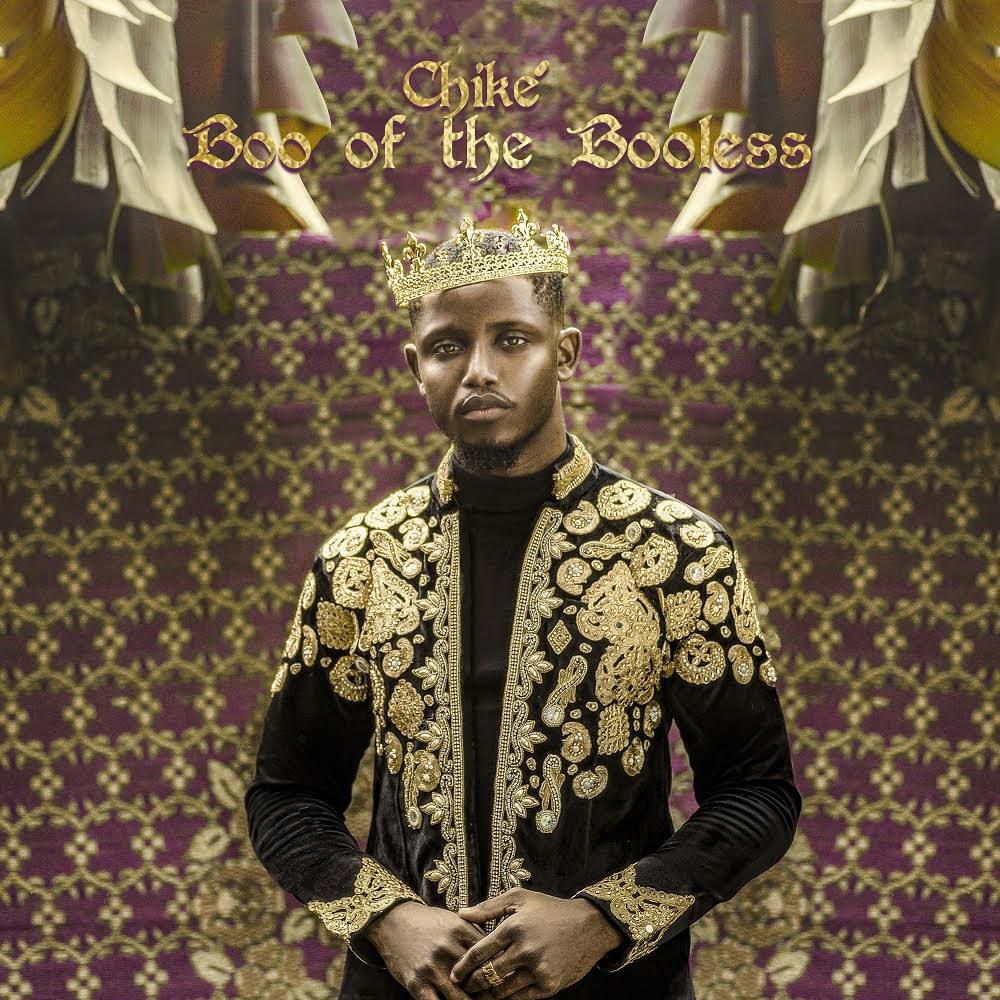Chike: Pulse speaks with self-acclaimed 'Boo of The Booless' [Interview]
)
The Nigerian soundscape is changing. It's such a unique time to be a dope songwriter, a good singer and a maker of 'good music' in Nigeria. The search for the next Nigerian pop sound is on and it presents the aforementioned types of people with a unique window.
Enter singers like Fireboy, Chike and Tems. They seem to be front-runners of this particular window who could really grab an opportunity and cement themselves in mainstream consciousness before the window closes. But this topic will be addressed holistically via video content from Pulse Nigeria.
For now, we shall address the calm , confident artist who just called this writer's phone. On the phone, he sounds tired and famished. That can be understood, the previous night, he held a live show/listening party for his debut album, Boo of The Booless. The album was also surpassing the expectations of the artist and his team.

At the party, this writer's female friend who met him there said this of the singer, "He has short confidence - the confidence that is usually associated with short/medium-tall guys. If he was tall, he might not have had such confidence. It's the kind of confidence that women like - people like that walk up to women and know they can get those women.
"Look at him, Tolani. He made a memorable entrance - he was boxing! If he wasn't going to trend on social media before, he would have trended after that entrance - he was also fit in briefs and quite handsome. Then, when he got on the mic to sing, his voice was so angelic." This female friend said just a few inches from Admiralty Road, Lekki. It was around 11 pm - the artist had just concluded his show.
Later, this artist later spoke about boxing into the venue to perform, "So, two things. This is like a tip for singers and performers; when you box and exercise, it opens your airwaves. I knew I was gonna perform 14 tracks. And we were singing on our own - no backing tracks. So, I did that for my airwaves and entertainment.
"You need to entertain people. I knew people would take out their phones and record for social media. I wanted to make sure that people knew something happened there yesterday. For the tens of people there, they could broadcast to a 100 more people - maybe millions, God knows."

During the show, the venue was packed to the rafters. In fact, when electricity went off twice. Yet, everyone remained in their seats till the show was over. On that, this artist says, "We never expected the place to be that packed.
"I understand that one thing about growth is that we gather data, but I don't know if to say we underestimated ourselves. In fact, after the show I thought we should have had somewhere bigger, but a friend told me that I should take my wins.
"Then, I decided to start seeing the overcrowding as the blessing that it is. It would have been worse to select a bigger venue, but with limited attendance. However, I'm kinda mad that we could have made extra money (laughs). That night, people bought tickets and albums, and they were singing songs from the album just two days post-release.
"Just before the show, I was worried. My team and I are a small group of people so everything still gets to me. It felt like everything was shaking till the go. But once I got in there and I saw that people were genuinely happy to see me, I was like 'let's go' and we did."
Back to the present

It was the morning after his show. He was dressed in a shiny brown shirt, black jeans and a pair of Louis Vuitton sneakers. He also had sunglasses on - to hide his fatigue. We shook and went into the recording wing of Pulse. However, the studios were busy so we got talking. One thing was palpable in him, he likes things to go at his pace.
Regardless of how much you try to push and prod to test his calm, he never lost his balance. He always completed his sentences and never cut them short. But despite his confidence, his humility and shock were evident while he was talking about the reception of his album, Boo of The Booless.
The album had dropped just three days prior and it was growing purely by its quality, word of mouth and the power of social media.
"Bro, I don't know how to describe it. We've all been shocked. I mean, Fireboy's album is there, but my album is right next to it. I know the numbers might not be a lot to others, but I never saw this reception coming. I distribute my music by myself and I see the numbers as the grow - so, I'm shocked.
"The album trended when it dropped. I would say that we substitute finance for social capital (people). When money wasn't as available, people worked - you know. If you liquidate these people, it's still money and I'm just happy that people put their backs on the line for this to show support - it's amazing that worked."
"I feel happy. I feel grateful. My happiness emanates from how I was only able to mentally picture this moment (the reception of my debut album) to seeing this reality. It's taken me a lot and I'm just careful I have jumped all the hurdles - they made me who I am today. " he says.
Who is Chike?

Born Chike Ezepeazu Ebuka in Wuse General Hospital, Abuja in a spot that he knows, Chike also grew up in Abuja - foreign affairs quarters, zone VI. His dad worked for the government and reached great heights in his craft.
You might know him better as the beautiful voice from Project Fame and The Voice Nigeria. But since he appeared on those platforms, he has matured and grown. Life is different for him and he is making strides in the music industry. All on the strength of his resonant voice and carefully cherry-picked sounds, he is growing.
Moving to Lagos, making music and Project Fame
Chike's family is filled with singers. In his hometown, his aunts could sing and were in bands. But he didn't really pay attention to that side of himself. He would always sing, but he never took it seriously. All his three brothers would sing and even joined the choir or found different avenues to showcase their voices. Chike would continue to be passive about his gifts until he started attending Covenant University.
While studying, he briefly became a member of the choir - but that was short-lived. That journey to school for higher learning also brought him to Lagos. He would always come to Lagos and often refuse to go back to Abuja. But then, he graduated and started the mandatory one-year National Youth Service Corps in Benin City, Edo State, Nigeria in 2014.
Still, he kept coming back to Lagos and would spend half of his time in Lagos. After youth service, he moved to Lagos permanently. Around this time, he started creating music.
He says, "When I started making music is when I started putting it out - I would say around 2014. When I actually entered to studio to make something, I put it out."
But that journey didn't begin there, it had been coming. For years prior to that, Chike used to sing a lot and his friends would tease him about it. Some of them would also urge him to take it seriously because they had become irritated by the incessant vocalizations. He says, "They knew I was an amazing singer, but they didn't want to hear it all the time (laughs).
"My best friend then - Mojisola Awotibe, who is married now - encouraged me to buy forms for Project Fame when the forms came out. She stood with me on the line in Ibadan - yes, I auditioned in Ibadan because I thought it would be easier. Initially, I went to Abuja, but I felt competition was too stiff.
"So, I told my dad and he gave me his driver - we went to Ibadan. I mean, I could have gotten in through Abuja, but Ibadan was easier - you have to be smart. I was almost 100% sure that I was gonna get in through Ibadan except God nor want make e happen, but I did."
On his experience on Project Fame, Chike says it was more a learning curve than a real experience. He says that he learned how to not "over-twist" songs, how to express himself and more.
Providence: The Voice
When Chike was done with Project Fame, he had no intention of going back in for another reality show. But then, he was confronted with making a calculated decision. He says, "I saw The Voice as a bigger platform and if we're genuinely speaking, it is. I just felt everything was going to be far more amplified and it was.
"When I was there, I believed in what I was doing because I already know what I was doing (than Project Fame). Even though I might have been doing it wrong, I just had to sell it to look right."
While his journey seemed ordained, Chike didn't start believing in providence until recently. "Things are meant to happen and they happen. I would not be overcritical of anybody who has not been able to find their way, I'm still looking for mine, but what I can say is that it starts from the mind. You need to believe that in spite of the difficulty, it can get done," Chike says.
He says that it took him a while to start believing and it took positive people around him to also believe. In the end, Chike believes that people have different journeys.
Universal Music Nigeria
After Chike left The Voice, he was automatically signed to Universal Music Nigeria. However, in November 2017, he left Universal Music Nigeria by mutual agreement to terminate the deal after terms were breached. Nonetheless, Chike has no regrets nor does he blame the label - he claims that spell was another learning curve for him.
He says, "The plans I had for myself was different to the plans they had. So we were able to come to an agreement that it wasn't going to work. Nonetheless, in the future when our vision aligns, we could always work something out.'
Album mode
After Chike left Universal, he started putting out singles and started getting attention. But then, he felt like he needed to stand out from a saturated crowd that was doing the same thing. He felt and knew that people needed to experience his work - considering his sound. When he considered the funds he required to push a single, Chike decided to put out an album.
"Shout-out to Ric (Hassani)... I see my back end and what happens when people listen to my music and I watched the market and I saw the response. In first quarter of 2019, I decided to put out an album. At the time, I already had songs, but I was trying to pick out a single," he says.
Boo of The Booless

The oldest song that made Boo of The Booless is 'Beautiful People' - the album opener. But then, the album has 14 songs that Chike and his team felt cohesive enough to form an album. Chike has more than 20 other songs that were considered, but were ultimately dropped - maybe, some of them will eventually see the light of day.
"I had over 30 tracks to choose from. I wanted to go for a 17-19-track album, but then strategy and my team refused that. So, I decided to go for 14 - 19 might have been too risky," the vocalist says.
When the album was done, it was not going to be titled, Boo of The Booless. It was going to be titled, African Prince. In his mind, Chike had plans for African collaborations, but he feared the presence of another album with that title. Thus, he felt 'African Prince' might not work, and he moved the collaborations out and found something else.
With Valentine's Day approaching, Chike and his team felt like it was a miserable time for many who were single. For the season, with an album filled with love tunes and with a fan base that liked such sounds, Chike felt like he was the Boo of The Booless and the album found a title.
"I felt like the album had love songs for different kind of situations. I wanted the album to be there for different kinds of people through my voice. When I announced that the album was going to be titled, Boo of The Booless, opinions were split and I liked it (laughs)" he says.
In the same vein, Chike feels like he only made this music because he can't get emotion out of his music. However, he feels music is art and expression should be free.
As such, there will be days he will feel like making pop music. He says, "There's a song that was left off the album - not because it wasn't strong enough, but because it didn't fit the strategy. It was just chanting all through, but it didn't make the album. The day I feel like making a pop record, I will make one."
While Chike isn't giving anything away, he claims most of the songs came easy. He also says that while he won't name names on camera, there are features that couldn't come through for the album or came late. If they had tried to fit the songs into the project, it would have delayed the album's release.
Inspiration for songs on 'Boo of The Booless' and message from Dad
While albums like this feel so authentic and first-hand, Chike claims that some of them are imagined experiences that were embellished versions of real-life experiences. But on the album, Chike also visits some sensitive topics like insecurity, forgiveness, faithfulness and so forth. Men are usually reluctant to touch some of these topics, but not Chike.
He says, "I feel like there's a part of men that doesn't want to express certain emotions. The fact that I sang about some of these issues don't mean I don't go through them a lot of times. The fact that I owned up to some emotions on the music doesn't mean I've owned up to them in real life. In our culture, we're raised to 'be a man' by being non-expressive.
"The first time I broke down because of a relationship that went south, I didn't know my Dad noticed because he's 'a man.' But then, he walked into my room and said to me in Igbo that, 'I don't raise men who cry for women' and it wasn't about crying for women. I was just going through a lot."
Costs and PR
To create the album, Chike needed a lot of self-funding. However, he says that while he was making the album, he got shows and those helped him raise funds for the album.
In the end, while Boo of The Booless has succeeded with word of mouth/human capital, Chike says he will never underrated PR. He says, "You can't underestimate PR. It is how you get your music to those who have not heard about it. It could also be how you get a hit."
The rest of 2020
For the rest of 2020, Chike would be looking to promote more intentionally and video shoots. According to Chike, "A strong contender is 'Nakupenda.'" Asides that, Chike plans to have a bigger show in the final quarter of 2020.
)
)
)
)

)
)
)
)
)
)
)
)
)
)